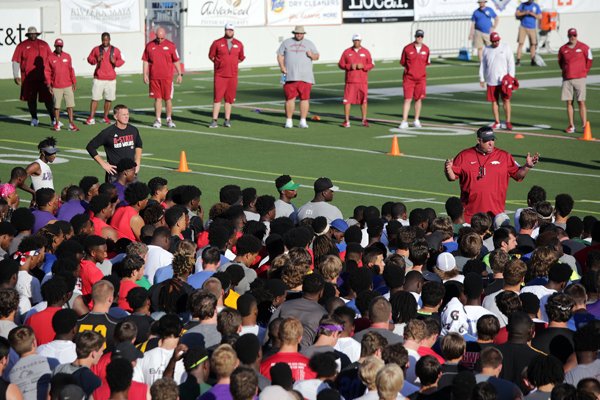The NCAA wants to restrict when and where college football coaches can hold satellite camps and have two early signing periods for high school prospects.
The two proposals by the Division I Council announced Wednesday were recommended by the football oversight committee as part of comprehensive reforms to the recruiting calendar. The council also recommended allowing FBS schools to have 10 assistant coaches.
The proposals need approval by the Board of Directors, and the Collegiate Commissioners Association, which administers the national letter of intent recruits usually sign to make binding commitments to schools, must OK the early signing periods. The new rules would go into effect for the 2017-18 year.
Under the proposals, football coaches would be limited to 10 days of their choosing in the summer during which they could participate in camps with high school prospects. Coaches could still participate in camps on other college campuses, but not at high schools.
Under current rules coaches are allowed two 15-day periods during which they can hold camps.
The two new 72-hour early signing periods would be held in late June, giving prospects the chance to sign before their senior years, and mid-December when junior college transfers are allowed to sign. The traditional long signing period, which begins the Wednesday of the first full week in February, would be unchanged.
Satellite camps became a hotly debated topic the past two offseasons, reaching a peak earlier this year when they were briefly banned by the NCAA. The ban was later overturned in time for camp season.
Supporters of the camps say allowing coaches to attend camps away from their own campuses helps increase exposure and opportunities for high school players hoping to land a scholarship. Opponents say the camps are solely about recruiting outside the recruiting calendar.
The argument turned into something of a battle between North and South, and more specifically Michigan coach Jim Harbaugh against the Southeastern Conference.
It was the Atlantic Coast Conference's proposal to ban the camps that passed early this year. But it was SEC coaches such as Alabama's Nick Saban and Mississippi's Hugh Freeze who were among the most vocal opponents of Harbaugh, Urban Meyer of Ohio State, James Franklin of Penn State and others setting up shop in the recruiting hotbeds around the Southeast.
"We needed to limit the number of days (for camps and clinics) and do things differently than we did before," Big 12 Commissioner Bob Bowlsby, who leads the football oversight committee, said in a statement Wednesday. "But the best chance for us to manage this is to acknowledge that the summer is about recruiting, not skill development, and to manage it in ways that reflect best on our universities and the process."
Early signing is another issue that has been haggled over for years, with coaches all over the place on what would be best. The idea behind it is to give prospects that have made up their mind a chance to officially end the recruiting process.
"The working group did a deep dive on recruiting from beginning to end, and I think what we came up with as a proposal is both student-athlete-friendly and coach- and staff-friendly," Bowlsby said.
Former Nebraska coach Bo Pelini and Arizona coach Rich Rodriguez are among those who have endorsed eliminating signing periods all together and allowing high school prospects to sign with schools whenever they want.
Meyer recently came out against early signing, saying it would be used as a tool by coaches to pressure recruits into locking in their non-binding verbal commitments earlier.
"Young people have a right to choose where they want to go to school. Let them de-commit a hundred times," Meyer said. "That's why they're called 17-year-olds.

